Why Referral Programs are a Game-Changer for Your Business
Looking for a cost-effective way to boost your customer base and increase brand awareness? A referral program might be exactly what you need. Referral programs tap into one of the most powerful forms of marketing: word-of-mouth. When your customers recommend your business to others, it’s not just a suggestion—they’re vouching for your brand, and that’s trust that money can’t buy.
In this ultimate guide, we’ll break down everything you need to know to create a successful referral program that not only incentivizes your current customers but also helps you attract new, loyal clients.
Let’s dive in!
In this ultimate guide, we’ll break down everything you need to know to create a successful referral program that not only incentivizes your current customers but also helps you attract new, loyal clients.
Let’s dive in!
What Exactly is a Referral Program?
At its core, a referral program is a marketing strategy that motivates your existing customers to recommend your product or service to others. By offering rewards for successful referrals, your customers become your brand ambassadors, helping you grow your business organically.
The best part? Referral programs are cost-effective and have an extremely high conversion rate because people trust recommendations from their friends and family more than ads or marketing messages.
Why does this matter? Referral programs allow you to leverage the power of your current customer base, turning your happy customers into your best salespeople—and they do it for you, for free!
The best part? Referral programs are cost-effective and have an extremely high conversion rate because people trust recommendations from their friends and family more than ads or marketing messages.
Why does this matter? Referral programs allow you to leverage the power of your current customer base, turning your happy customers into your best salespeople—and they do it for you, for free!
The Amazing Benefits of a Referral Program
- Lower Acquisition Costs: Traditional marketing can be expensive. Referral programs are a cost-effective way to acquire new customers, as you only pay when a referral leads to a successful action—such as a sale or sign-up. You’re incentivizing your existing customers to bring in leads, which means your customer acquisition costs are significantly lower.
- Increased Trust and Credibility: People trust recommendations from friends and family more than any ad. When your customers refer others to you, it’s a social proof that your business is worth checking out. It’s much easier to convert referred prospects into paying customers because they already trust the source of the recommendation.
- Higher Customer Retention: Referred customers are likely to stick around for the long term. Studies show that referral customers tend to have a higher lifetime value than other customers. Plus, your referral program can help build loyalty with your existing customers, keeping them engaged and motivated to share your brand.
- Boosts Your Reach: When your customers refer their friends and family, your reach expands exponentially. You’re not just relying on paid ads or SEO to generate leads—your network is doing the work for you.
- Increased Referrals Lead to More Revenue: The more your customers refer, the more your business grows. It’s a win-win for both your customers and your business. The right program will lead to repeat business, higher conversion rates, and ultimately, more revenue. Referral leads are highly likely to convert.

Types of Referral Programs You Can Use
Not all referral programs are created equal, and the type you choose should align with your goals and business model. Here are the most common referral program types and why they work:
1. Customer Referral Programs
This is the classic referral program that motivates your existing customers to share your business with their friends and family. The key here is to offer rewards that incentivize both the referrer and the person they refer.
- Example: Offer a discount or gift card for each successful referral, and give the person they refer the same benefit. This "double-sided" reward is incredibly effective because it benefits both parties.
- Why it Works: People are naturally inclined to share things they love, especially when they have something to gain from it. Offering a reward makes the process feel mutually beneficial, and customers are more likely to share your brand with others.
2. Partner Referral Programs
In this type of program, businesses partner up and refer customers to one another. Often, the referrer receives a commission or other incentive.
- Example: An online retailer might partner with an e-commerce platform, offering a commission for every customer referred through the platform.
- Why it Works: Partner referral programs help you tap into new audiences who are already aligned with your business. You’re leveraging the trust and credibility of another brand to attract high-quality leads.
3. Employee Referral Programs
Encourage your employees to refer new customers or candidates by offering them rewards for successful referrals. This type of program can also be used to attract new hires.
- Example: Offer employees a bonus for each successful referral that leads to a sale or hires a new candidate.
- Why it Works: Employees are your best advocates—they’re already familiar with your business and are likely to refer people who align with your company’s values. Plus, employee referrals tend to lead to higher-quality customers and employees.
4. Influencer/Affiliate Referral Programs
Influencers or affiliates refer customers to your business in exchange for compensation, often performance-based.
- Example: A fashion brand might partner with an influencer to promote their products. The influencer earns a commission for each sale made through their unique referral link.
- Why it Works: Influencers have dedicated audiences who trust their opinions. This makes it an ideal way to generate awareness and build credibility, especially in industries where influencer trust is critical.
How to Build a Referral Program that Works
Creating a successful referral program isn’t a one-size-fits-all process. You need to define your goals, choose the right rewards, and make the referral process easy for your customers. Here's a step-by-step breakdown to help you get started:
Step 1: Define Your Goals
Start by asking yourself what you want to achieve with your referral program. Are you looking to acquire new customers? Increase brand awareness? Boost retention? Defining clear goals will help you tailor your program to your business needs.
Example Goals:
- Increase customer base: If your main goal is to acquire new customers, make your referral incentives attractive enough to motivate sharing.
- Boost brand awareness: Consider creating a shareable referral page that customers can easily post to social media.
Step 2: Choose the Right Rewards
The rewards you offer will be a major factor in your program's success. They need to be valuable enough to entice your customers to participate while being sustainable for your business.
Types of Rewards:
- Cash incentives: Offer money or gift cards for referrals.
- Discounts: Give customers a percentage off their next purchase.
- Exclusive perks: Offer exclusive products or services only available to those who refer others.
Tip: Consider a double-sided reward to encourage both the referrer and the referred to take action.
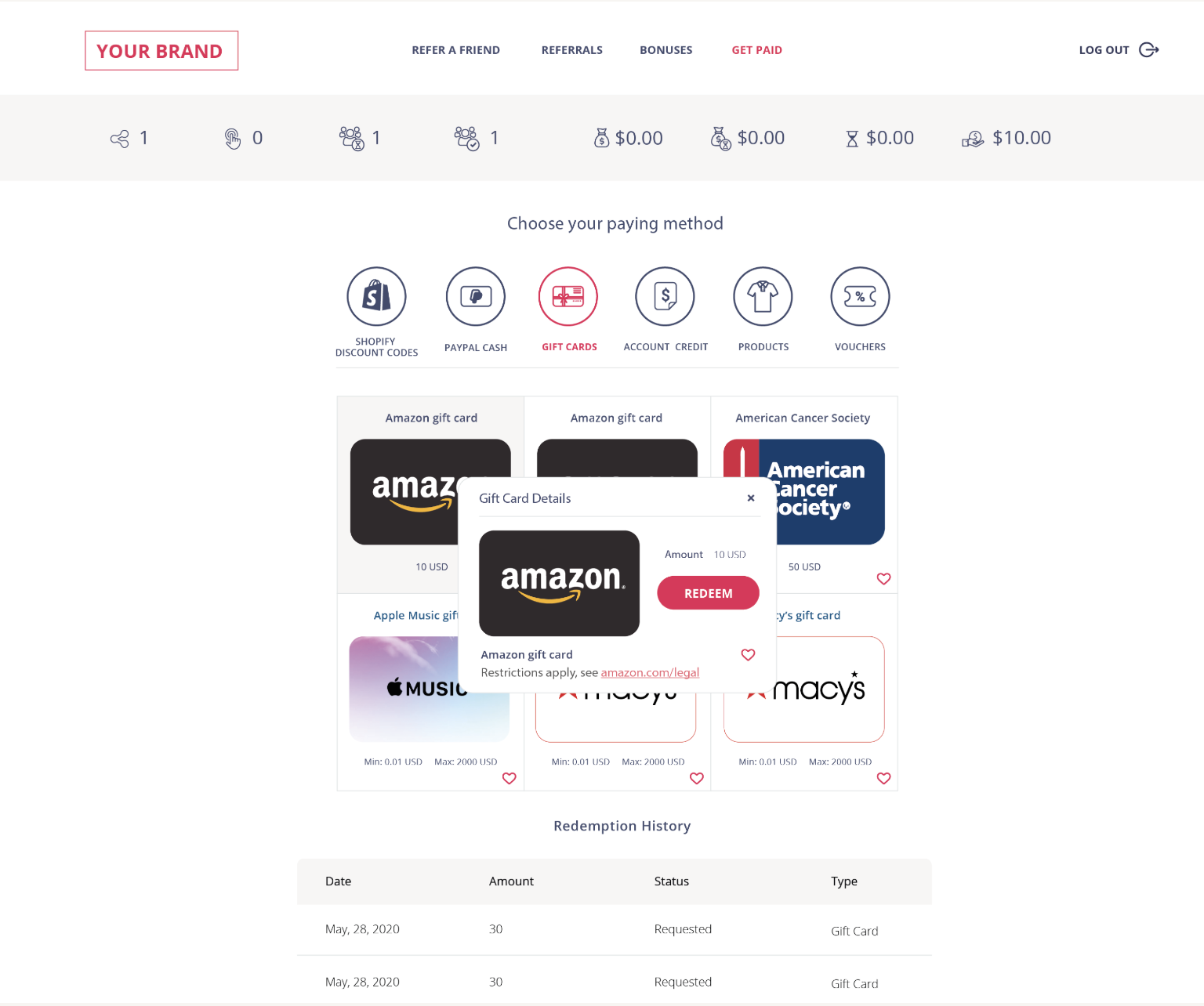
Step 3: Make the Process Simple
The referral process needs to be quick and easy. If it’s too complicated, people won’t bother. Ensure your customers can easily refer their friends with one-click links or easy-to-share social media buttons.
Tips for simplicity:
- Provide a clear call-to-action on your website, in your emails, and in your customer dashboard.
- Use an automated referral system to track referrals, rewards, and conversions.
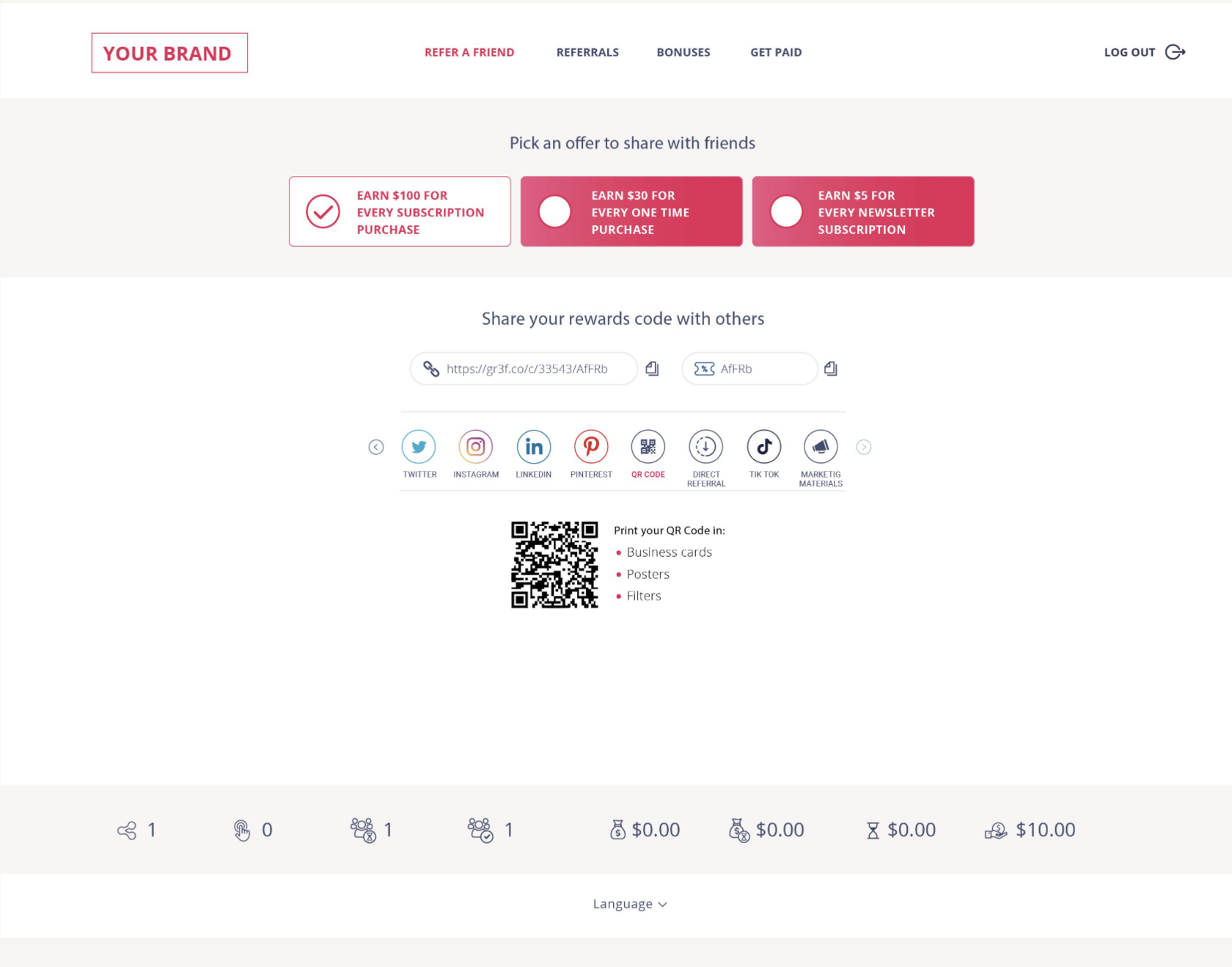
Step 4: Promote Your Referral Program
The best referral program in the world won’t do you any good if no one knows about it. Make sure you’re promoting your referral program across all channels—email, social media, your website, and even within your product.
How to promote:
- Send email reminders to encourage customers to refer others.
- Use social media to share success stories and referral milestones.
- Make sure it’s front and center on your website for easy access.
Step 5: Track and Optimize
After launching your referral program, monitor its performance. Track key metrics such as referral conversion rates and reward redemption. Use the insights to continually optimize your program for better results.
What to track:
- Referral Participation: How many people are referring others?
- Referral Conversions: How many referrals lead to actual sales?
- Customer Lifetime Value: Do referred customers have higher retention rates?
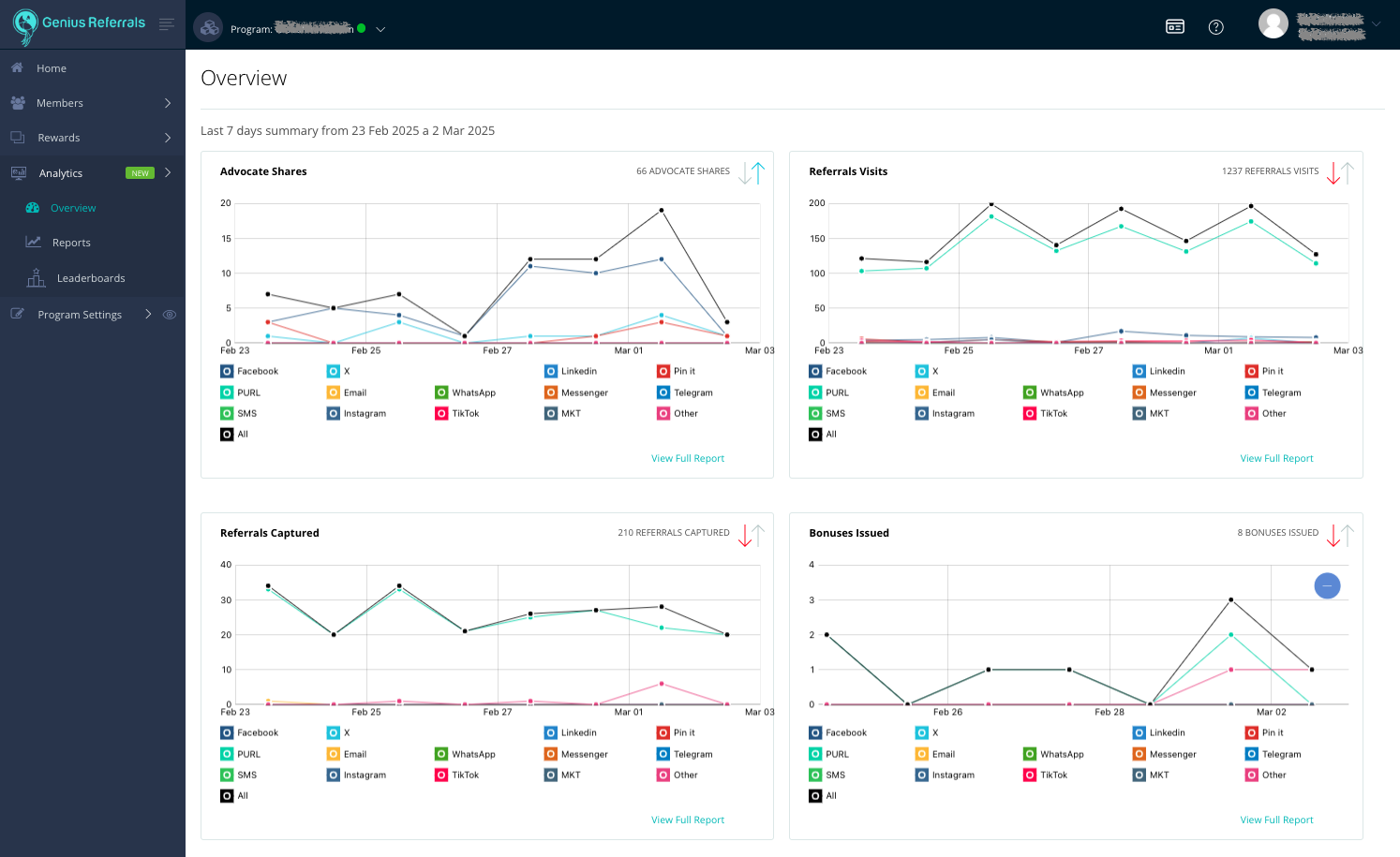
Successful Referral Program Examples
Want to see how the pros do it? Here are a few companies that have used referral programs to fuel remarkable growth:
Dropbox’s Explosive Growth
Dropbox grew from 100,000 to 4 million users in just 15 months, thanks to a simple but powerful referral program that offered 500MB of free storage for every successful referral.
- What They Did: Dropbox offered extra storage space to both the referrer and the new user.
- Why It Worked: The incentive was highly valuable to their target audience (users who needed more storage).
- Result: Their referral program helped them grow by 3900% in just 15 months.
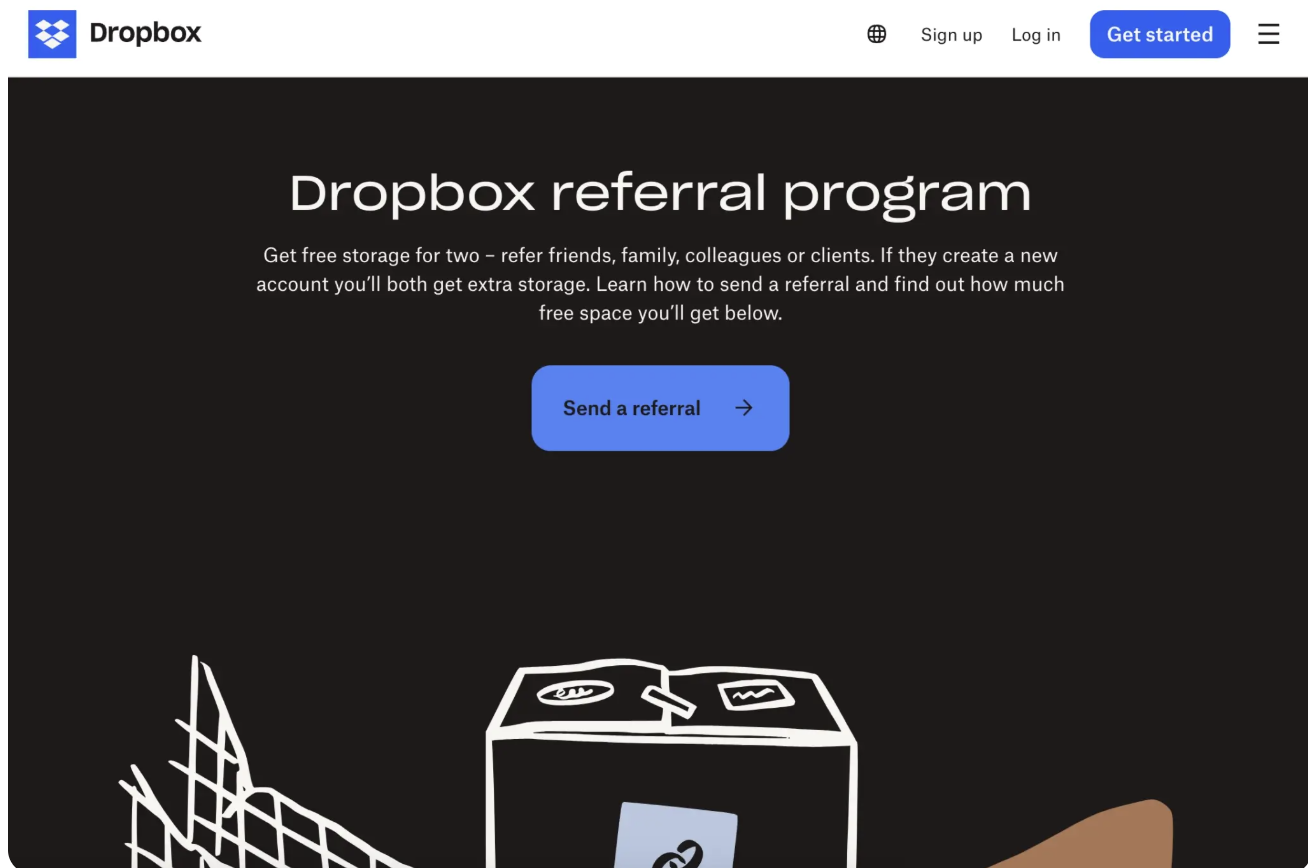
Airbnb’s Word-of-Mouth Success
Airbnb’s referral program encouraged users to invite others to book a stay or become hosts, rewarding both the referrer and the referred with travel credits. The result? Massive growth in new customers and hosts.
- What They Did: Airbnb rewarded both the referrer and the new user with travel credits.
- Why It Worked: The rewards were directly tied to their service, encouraging repeat bookings.
- Result: Their referral program became a key driver of their global expansion.
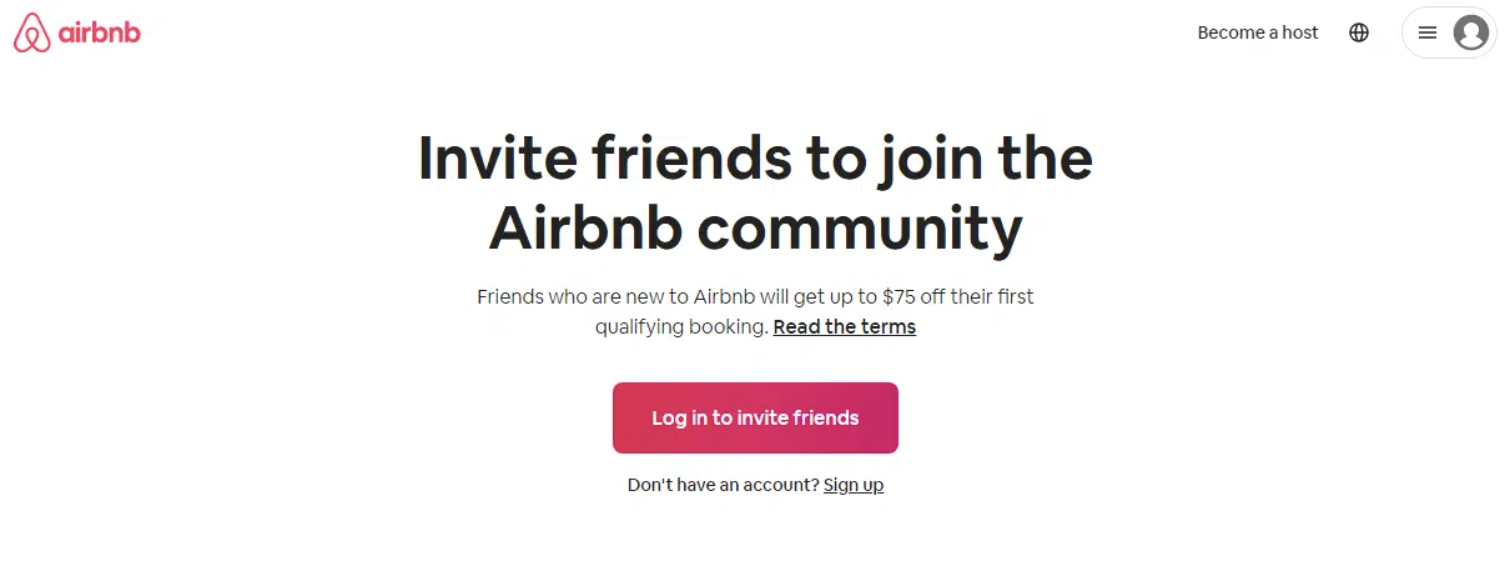
Tesla
- What They Did: Tesla offered exclusive perks like free Supercharging or invitations to special events.
- Why It Worked: The rewards created a sense of exclusivity and urgency.
- Result: Their referral program generated buzz and strengthened brand loyalty. (TechCrunch)
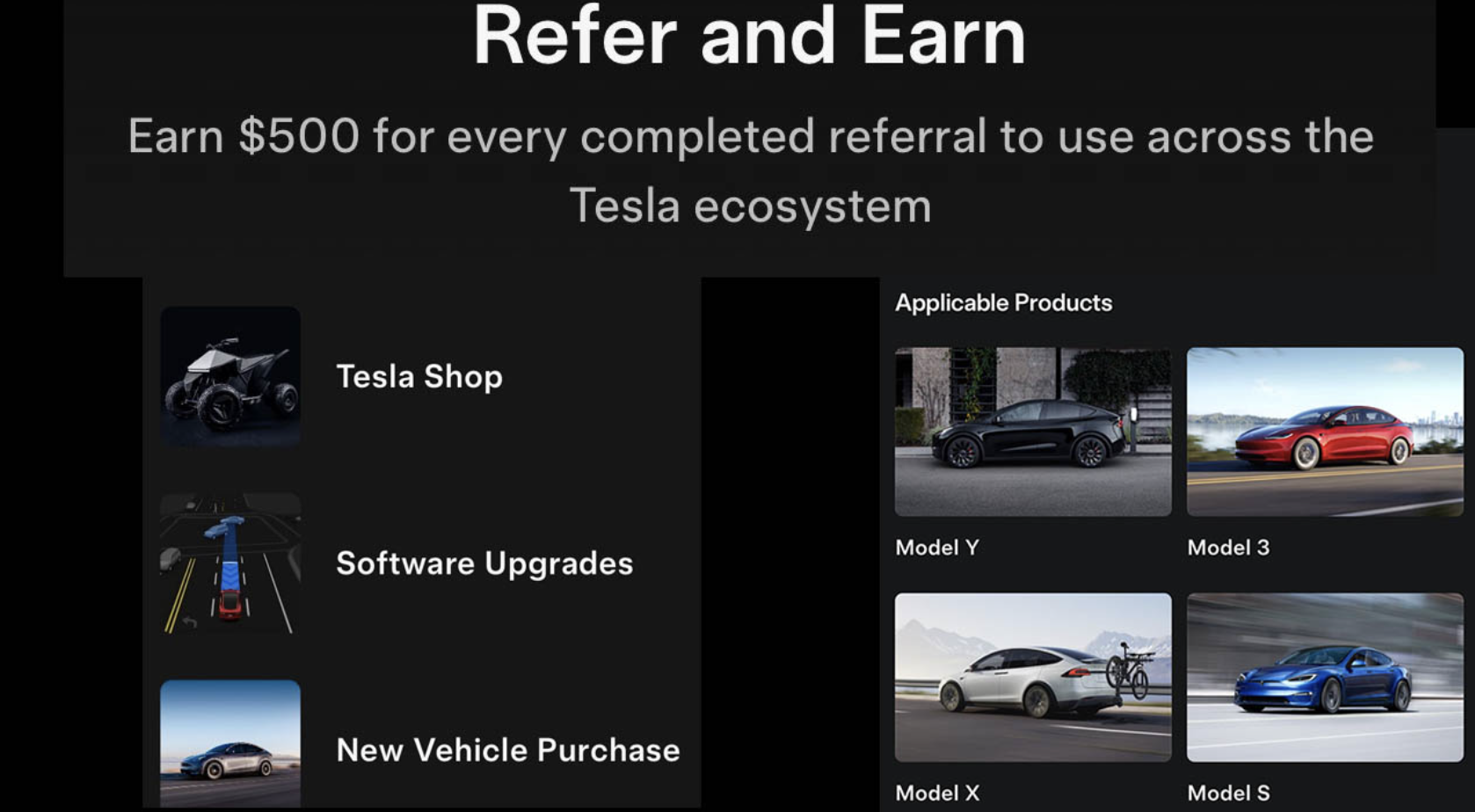
Revolut
- What They Did: Revolut, a digital banking app, offered cash rewards to both the referrer and the new user for signing up and making a transaction.
- Why It Worked: The cash incentive was simple, immediate, and appealing to a wide audience.
- Result: Their referral program helped them rapidly acquire millions of users globally, making it one of the fastest-growing fintech companies. ( Latterly.org )

Protect Your Program from Fraud
One of the most critical steps to creating a successful referral program is to ensure it remains secure and free from fraud. Unfortunately, referral programs can be vulnerable to exploitation. Some customers might try to game the system by referring themselves or using fake identities to earn rewards. Here’s how you can protect your program:
- Use Unique Referral Links: Ensure that each referral has a unique link or code that can be easily traced. This makes it harder for fraudsters to refer themselves and earn rewards unfairly.
- Set Clear Referral Criteria: Clearly define the rules for a successful referral. This will help prevent fake referrals and give your team a clear set of guidelines for what constitutes a valid referral.
- Implement Fraud Detection Tools: Use fraud detection tools to track and identify suspicious activity. Some platforms offer automatic fraud detection, helping you to catch potential issues early.
- Monitor Referral Activity Regularly: Keep an eye on referral patterns. Look for irregularities or unusual spikes in referrals that could signal fraudulent activity.
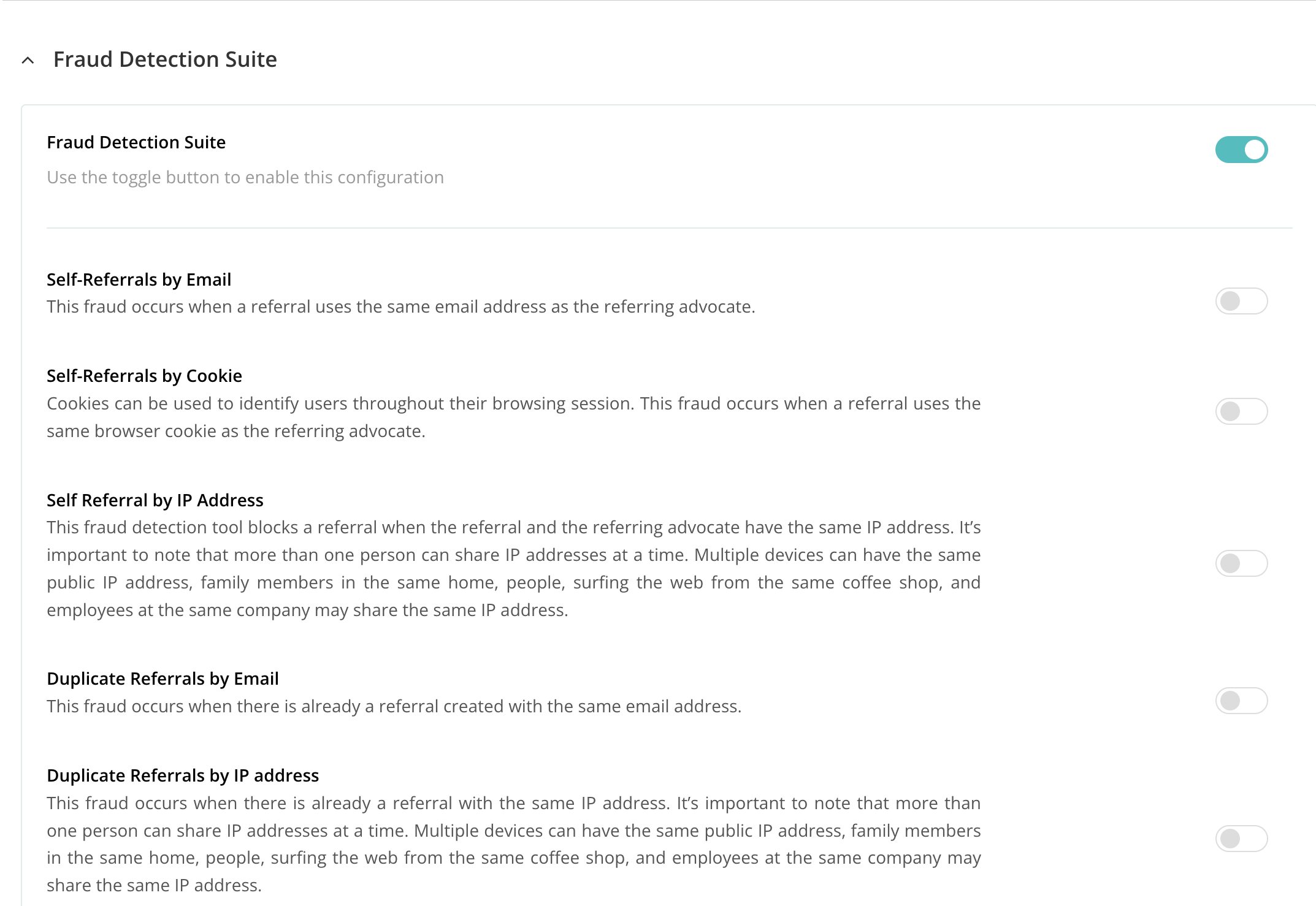
Common Mistakes to Avoid When Creating Your Referral Program
While referral programs are an excellent way to grow your business, there are a few common pitfalls that can hurt your program’s effectiveness. Here are mistakes to avoid:
- Not Defining Clear Goals: Without clear goals, your referral program could lack direction and fail to deliver the results you want. Make sure you know whether your goal is to acquire new customers, increase engagement, or boost sales.
- Offering Unattractive Rewards: Your rewards should be enticing enough to motivate customers to take action. If your rewards are too small or irrelevant, customers will not feel compelled to refer others.
- Making the Process Too Complicated: Keep the referral process simple. If it takes too many steps for customers to refer someone, they’re less likely to participate. Ensure the process is as streamlined as possible.
- Neglecting to Promote the Program: Simply launching your referral program isn’t enough. You need to actively promote it via email, social media, and your website to make sure people know about it and are motivated to participate.
- Ignoring Program Analytics: Failing to track and analyze your program’s performance can leave you in the dark about how well it’s working. Regularly review key metrics and optimize your program for better results.
FAQ: All Your Referral Program Questions Answered
How do I track referrals in my program?
Most referral program software platforms, like Genius Referrals, offer automated tracking features that will help you monitor referral links and activity. These platforms typically provide detailed analytics so you can see which customers are referring the most people and how those referrals are converting.
Can I reward both the referrer and the referred?
Yes! Many successful referral programs offer double-sided rewards—rewards for both the person making the referral and the person being referred. This can include discounts, cash rewards, or exclusive offers.
How do I prevent fraud in my referral program?
To protect your program from fraud, make sure you use unique referral codes, set clear criteria for successful referrals, and monitor activity for suspicious patterns. You can also implement fraud detection software to automatically catch fraudulent behavior.
How do I promote my referral program?
Promote your referral program through email campaigns, social media posts, and on your website. You can also feature it prominently in your product’s user dashboard to ensure customers are aware of it.
Most referral program software platforms, like Genius Referrals, offer automated tracking features that will help you monitor referral links and activity. These platforms typically provide detailed analytics so you can see which customers are referring the most people and how those referrals are converting.
Can I reward both the referrer and the referred?
Yes! Many successful referral programs offer double-sided rewards—rewards for both the person making the referral and the person being referred. This can include discounts, cash rewards, or exclusive offers.
How do I prevent fraud in my referral program?
To protect your program from fraud, make sure you use unique referral codes, set clear criteria for successful referrals, and monitor activity for suspicious patterns. You can also implement fraud detection software to automatically catch fraudulent behavior.
How do I promote my referral program?
Promote your referral program through email campaigns, social media posts, and on your website. You can also feature it prominently in your product’s user dashboard to ensure customers are aware of it.
Conclusion: Ready to Launch Your Referral Program?
A well-designed referral program can transform your customers into brand advocates and drive sustainable growth. By following this guide, you’ll be equipped to create a program that delivers real results for your business. Start small, measure success, and scale up as you see progress.
Referral programs are one of the most powerful and cost-effective ways to grow your business. With the right strategy, rewards, and promotion, you can turn your existing customers into your biggest advocates, driving new leads, higher customer retention, and ultimately, more revenue.
Start today and see how Genius Referrals can help you launch a referral program that works for your business!
Referral programs are one of the most powerful and cost-effective ways to grow your business. With the right strategy, rewards, and promotion, you can turn your existing customers into your biggest advocates, driving new leads, higher customer retention, and ultimately, more revenue.
Start today and see how Genius Referrals can help you launch a referral program that works for your business!
